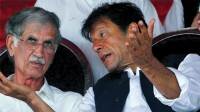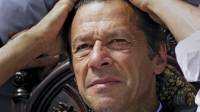The Pakistan Tehreek-e-Insaf (PTI) has settled into power in militancy-ravaged Khyber Pakhtunkhwa (KP) at the head of a coalition government after some initial hiccups due to the lobbying by many of its lawmakers for cabinet positions and also on account of the disagreement with its junior partner Jamaat-i-Islami (JI) over allocation of the education portfolio.
Both the issues were eventually resolved, though Imran Khan had to intervene to make it happen. It is now obvious that the PTI founder would be guiding Chief Minister Pervez Khattak and the provincial PTI leadership not only in matters of policy but also in running the government in the province, and resolving issues that may crop up among the coalition partners and within the ranks of his own party.
The PTI leaders in KP have faced criticism, particularly from the previous ruling Awami National Party (ANP), for failing to take decisions locally and allowing Imran Khan and the central leadership to rule the province through remote control.
Pervez Khattak and the provincial Information Minister Shaukat Ali Yousafzai responded by arguing that they got votes in Imran Khan’s name and were bound to seek his guidance for implementing the PTI policies and manifesto in their province.
The ANP, still trying to come out of the shock of its worst ever electoral defeat in the May 11 general election, was anxious to expose the PTI’s weaknesses at the beginning of its tenure. Its leaders repeatedly pointed out that Chief Minister Pervez Khattak was taking orders from Lahore, where the injured Imran Khan was convalescing after being discharged from the Shaukat Khanum Memorial Hospital following treatment for his back injuries resulting from a fall during an election campaign meeting. As an advocate of provincial autonomy and claiming to be champion of Pakhtun rights, the ANP was trying to establish that Punjab was now ruling KP through Imran Khan, who happens to be a native of Lahore. This impression was reinforced when Pervez Khattak had to drive to Lahore a number of times to consult Imran Khan on formation of the PTI-led coalition government and for settling matters with the JI.
In exchange for the local government ministry, the JI agreed to give up the education portfolio that was promised to it earlier by the somewhat naive provincial PTI leadership which gave away some of the choicest portfolios to its three coalition partners. The local government portfolio was equally important for the PTI as it has promised to hold election for the local bodies in three months, but it had to give it to the JI to make their coalition work. The issue of exchanging portfolios was decided when the JI head Syed Munawar Hasan and the party’s deputy central leader Sirajul Haq, now the senior minister with the portfolio of finance in the PTI-headed coalition government in KP, met Imran Khan in Lahore.
PTI activists had criticised the decision to allocate education to a JI minister and Imran Khan had come under pressure to give the portfolio to a cabinet member belonging to his party for implementing the PTI’s plans for reforming the education sector. Many PTI workers and civil society activists had expressed concern that the JI could give the education system a more conservative direction if awarded the portfolio. Such misgivings, however, appeared misplaced as the JI had been part of the Muttahida Majlis-e-Amal (MMA)’s Islamic government in the province for five years after the 2002 general election and no major changes in the education system were made during that period. When in power, the JI has seldom challenged the status quo or heralded any major changes in the system of governance, justice, economy or education.
The PTI leadership faced problems in finalizing the list of its seven ministers in the 15-member cabinet in which three berths each were taken up by the JI and Aftab Sherpao’s Qaumi Watan Party (QWP), the third party in the coalition government, and one by the Swabi-based Awami Jamhoori Ittehad Pakistan (AJIP). There were many PTI aspirants for cabinet positions and eventually Imran Khan selected the final seven to check disunity in the party as its lawmakers couldn’t challenge his decision. Chief Minister Pervez Khattak had to drop his political aide Jamshed-ud-Din, belonging to his native Nowshera district, from the list of cabinet when Imran Khan intervened in favour of Ali Amin Gandapur, elected on the PTI ticket from Dera Ismail Khan and the PTI chief’s host during the party’s ‘long march’ against the US drone strikes from Islamabad to Tank on the way to South Waziristan. Jamshed-ud-Din was compensated by making him an adviser to the chief minister along with four other PTI MPAs. Another five PTI lawmakers were appointed special assistants to the chief ministers. There was little justification for all these appointments, but the PTI leadership and the chief minister had to do so to accommodate the many claimants for official positions. The appointments damaged the PTI’s image as it had promised good governance and criticised the PPP, PML-N and ANP for failing to do so while in power from 2008-2013.
The PTI-led coalition government also faced acts of terrorism soon after being installed in power. Two MPAs, who were elected as independents but had later joined the ruling PTI, were killed in targetted attacks. Farid Khan was killed in an ambush by suspected militants in his hometown Hangu sparking riots and revenge killings while Imran Khan Mohmand, who won election from rural Mardan against influential ANP, PPP, JUI-F and JI candidates, was killed in a suicide bombing at a funeral for a slain businessman in which more than 30 other people also lost their lives. There have been a number of other bomb explosions, including a suicide bombing at a Shia mosque-cum-seminary in Peshawar that killed 15 people gathered to offer Friday prayers.
The attacks took place even before the PTI government in the province and the PML-headed federal government could take the first steps to initiate the promised peace talks with the Taliban militants in a bid to peacefully end the conflict in the Federally Administered Tribal Areas (Fata) and KP. Any hopes of starting the peace talks had already been dashed to the ground with the assassination of Tehrik-i-Taliban Pakistan (TTP) deputy head Waliur Rahman in a US drone strike soon after the new government was installed in power as the militants had withdrawn their offer of negotiations after accusing Pakistan’s civil and military authorities of cooperating with the Americans in launching these attacks. There is little hope of undertaking any peace process at a time when the TTP and its allied groups have continued to carry out attacks and the PML-N and PTI have yet to consult each other and receive the support of the powerful military for peacefully bringing the conflict to an end. In such a situation when militancy is still a challenge and terrorist attacks continue unabated, the PTI-led coalition government would find it really hard to initiate any meaningful reforms in KP and come up to the huge expectations that the voters have attached to it.
The writer is a senior journalist based in Peshawar.
























